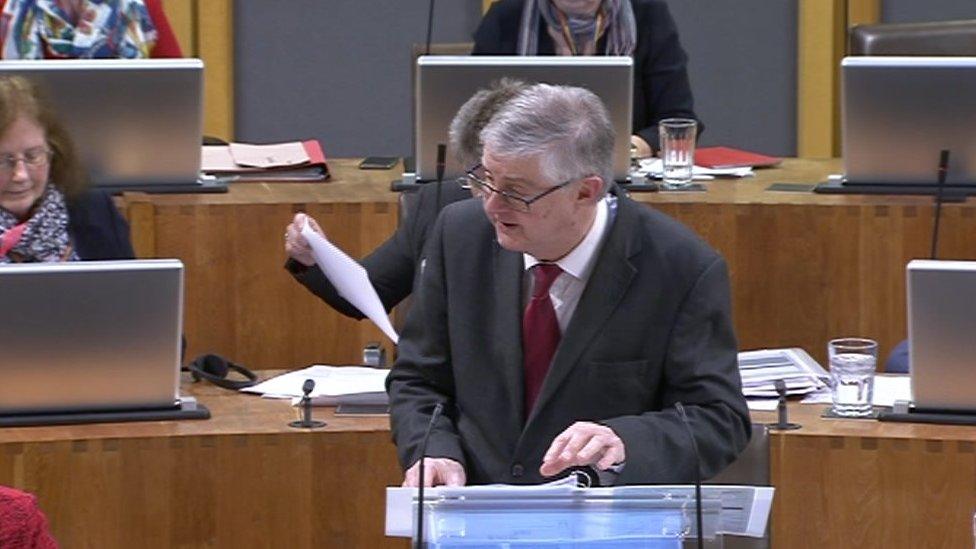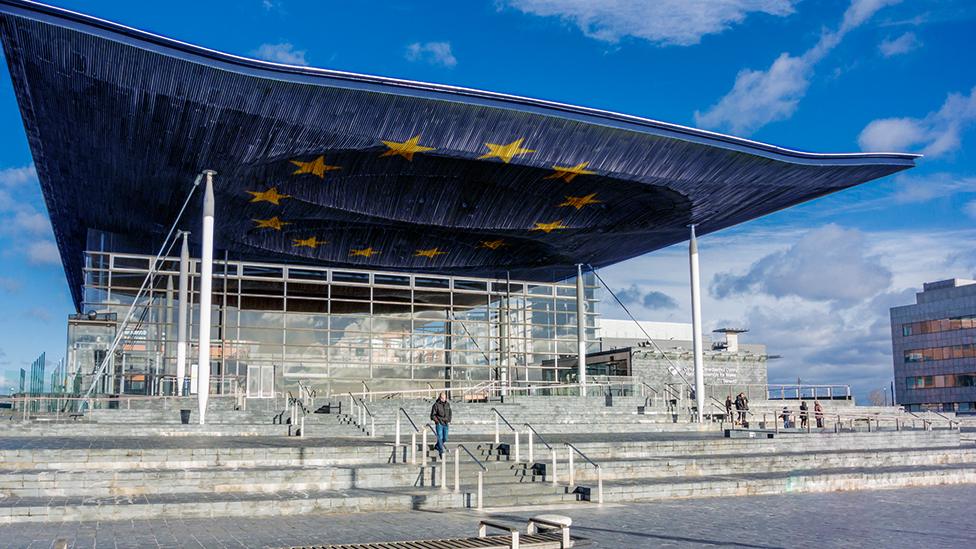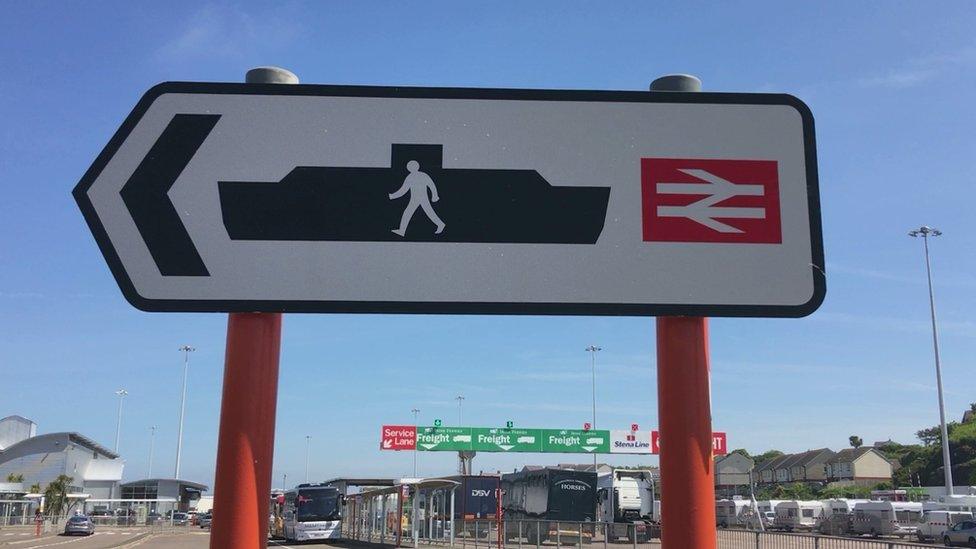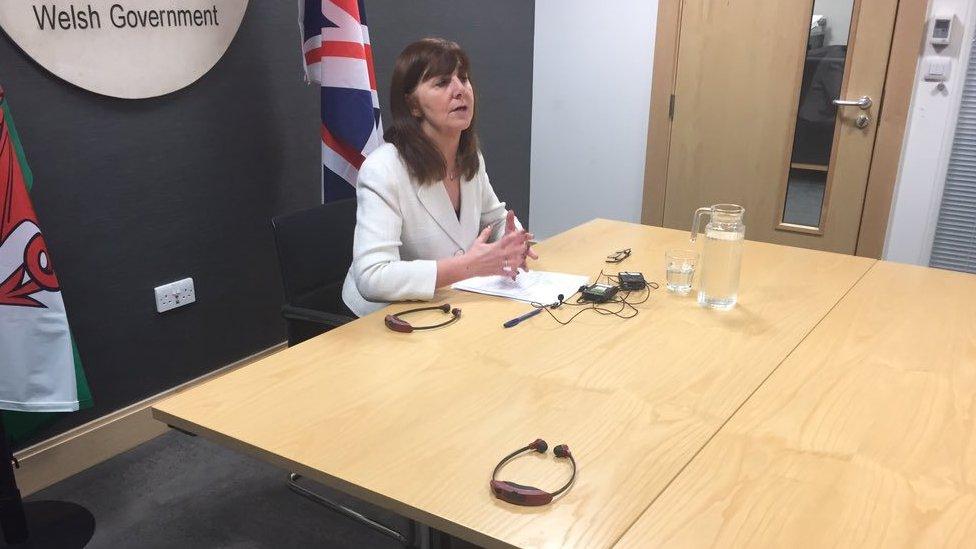Brexit: Drakeford closer to backing new EU vote amid no deal warnings
- Published
- comments

Mark Drakeford said he would back a further public vote if there is no agreement among MPs
First Minister Mark Drakeford says he will back a further referendum if MPs cannot resolve the Brexit deadlock in the next week.
He made the comments as Welsh ministers outlined possible risks to the NHS, the economy, transport and farming if the UK exits the EU without a deal.
Mr Drakeford said a no deal Brexit will have effects that will "be felt by everyone".
Tory AM Darren Millar accused ministers of "project fear on steroids".
UKIP's Gareth Bennett accused the Welsh Government of scaremongering, but Plaid Cymru leader Adam Price said the reality of House of Commons made necessary contingency planning for a no-deal Brexit.
Theresa May's proposed deal with the EU was rejected by MPs last week, in a historic defeat.
The Welsh Government had opposed Mrs May's deal, and prefers one that would bind the UK closer economically to the EU.
The comments come ahead of a meeting between the first minister and the prime minister on Wednesday.
'The only option'
Mr Drakeford told the Senedd that the impacts of a no deal Brexit "are potentially far ranging, and will be felt by everyone".
In remarks indicating he was moving closer to supporting a further referendum, Mr Drakeford said: "The debate in Parliament over the next week is the last opportunity to rally around that form of Brexit, one which has at its heart a future relationship based around continued participation in the single market and a customs union.
"If that cannot be done, the severity of 'no deal' is so great that if Parliament cannot agree a majority position on a deal that secures our long term economic interests, then the only option which remains is a second public vote to break the deadlock."
The Labour first minister has said he may campaign to remain if another EU vote was held.
It would not be for the Welsh Government to call a referendum but supporters of a further vote, including members of his own party, have called for him to lobby for one.

Much of the assembly's Welsh Government business was cleared on Tuesday for a series of statements on Brexit
Mr Drakeford called for Mrs May to take a no-deal Brexit off the table and extend Article 50 - the mechanism by which the UK leaves the EU on 29 March.
Much of the assembly's business that had been planned for Tuesday was scrapped, making room for statements on Brexit preparations.
In the Senedd Julie James, Welsh Government minister for local government, said there is no need for individuals to stockpile food: "We are not expecting widespread food shortages of any description."
But she said ministers are looking to ensure that "that supply chains for things like school meals or elderly persons facilities are still able to get all the ingredients they normally have".
Health
Vaughan Gething, health secretary, warned AMs that while the number and type of medicines that might be effected by a no deal Brexit is "relatively low", "the UK government cannot provide full assurance that Brexit will not affect business as usual".
He said disruption from customs checks at ports is likely to render radioisotopes useless for healthcare treatment, while a study had been commissioned to see how many EU workers are employed in social care and child care.
But UKIP's Michelle Brown questioned why the work had not been done before. "The referendum was over two years ago," she said.

Analysis by James Williams, BBC Wales Brexit correspondent
In the 'Being First Minister' documentary that followed Carwyn Jones' last months in office, there's a scene in which he's taken to task by his special advisers for saying in the assembly that the Welsh Government is not planning for a no-deal Brexit.
Back in November 2017, Mark Drakeford, then effectively the Welsh Government's Brexit Secretary, told a committee of AMs, external: "No amount of public money, no amount of preparation, will avoid the harm that will be done to Wales and its economy by leaving the European Union without a deal."
Having now stepped-up to the top job, Mark Drakeford is trying to give a very different impression of a government that is doing all that it can to prepare for the possibility of a no-deal Brexit - limited as that may be.
But despite the six statements in the assembly on Tuesday, a Welsh Government source tells me that ministers are purposefully keeping some of the no-deal Brexit planning, specifically around emergency planning, out of the public domain for fear that they become self-fulfilling prophecies.
They are, however, keen to get one overarching message out there time and again - a no-deal Brexit should be taken off the table.


Contigency planning is being made for Holyhead, Ken Skates said
Transport
A no deal Brexit could "cause severe disruption to the transport network and connected services within Wales", according to Ken Skates, the minister responsible for transport and the economy.
Mr Skates said there could be delays at ferry ports. While Pembroke Dock and Fishguard have space for delayed vehicles, Holyhead would find it more difficult.
Although UK government modelling says delayed traffic could be dealt with within the port, contingency measures are being considered - the nearby Road King truck stop and other sites have been identified.
Gareth Bennett, UKIP group leader, questioned why a whole day's business had been scrapped "largely to indulge in a day of project fear".
"They are just wasting time with more scaremongering and a lot of people in the chamber today are fed up with it," he told BBC Wales.
The sentiment was echoed by Tory AM Darren Millar who said in the Senedd that the warnings amounted to "project fear on steroids from the Welsh Government, without any temperance whatsoever for their position".
He made the claim after Jeremy Miles, who speaks on Brexit on behalf of the Welsh Government, said a no deal Brexit meant "fewer jobs, lower incomes, and a greater risk of poverty in communities throughout Wales".
Plaid Cymru's Adam Price called for a Welsh citizens assembly, which could be a precursor to a further referendum, to address "deeper issues... that Brexit has laid bare".

Lesley Griffiths said farmers may have "buried their heads in the sand" over Brexit
Farming
Earlier on Tuesday rural affairs minister Lesley Griffiths told a press briefing she was concerned that only 1,600 farmers out of a possible 2,000 had signed up for a red-meat benchmarking scheme to prepare for Brexit.
"I do wonder if farmers have buried their heads in the sand a little bit around Brexit," she said.
Ms Griffiths said farming leaders had told her that a no-deal Brexit posed a "cliff-edge of a perfect storm of really significant disruption to the Welsh economy".
She added that no-deal could lead to the shellfish industry collapsing, while tariffs for some products could exceed 50%.
- Published21 January 2019

- Published21 January 2019

